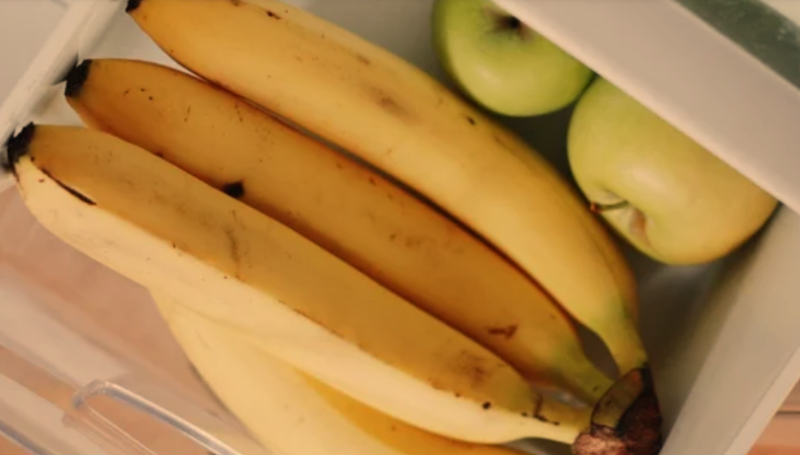People all across the world adore and eat bananas because they are such a versatile and tasty fruit.
There is no doubting their popularity, whether you prefer them as a quick on-the-go snack, blended into smoothies, or sliced on top of your morning cereal.
Nonetheless, the subject of whether to store bananas in the refrigerator or not comes up frequently.
Do they keep better in the fridge?
We’ll delve into the intriguing world of banana storage in this detailed guide, giving you the information you need to keep your bananas tasty and fresh.
The Debate: To Refrigerate or Not to Refrigerate?

The topic of refrigerating bananas has sparked debates among food enthusiasts and home cooks for years. Some argue that refrigeration can extend the shelf life of bananas, while others claim it turns the fruit mushy and ruins its flavor. So, what’s the truth? Can you put bananas in the fridge?
The Science of Banana Ripening
It’s important to comprehend the science of banana ripening in order to determine the best way to preserve them. Ethylene, a natural gas released by bananas, functions as a ripening hormone.
Bananas are often selected when they are still green and unripe. They progressively turn yellow as they ripen, and their starches change into sugars. This process is sped up by the ethylene gas production.
When to Refrigerate Bananas
Refrigerating bananas is a viable option when you want to slow down their ripening process.
If your bananas are ripening too quickly for your liking and you won’t be able to consume them in time, placing them in the fridge can help extend their freshness.
Here are some scenarios when refrigeration is beneficial:
- Overripe Bananas: If your bananas are already too ripe and you don’t plan to use them immediately, refrigerating them can halt the ripening process. This is especially useful if you want to save them for baking purposes, like making banana bread.
- Hot Weather: During hot and humid weather, bananas tend to ripen quickly, potentially leading to fruit flies and overripeness. Storing them in the fridge can slow this down.
- Extended Storage: If you bought a large bunch of bananas and won’t be able to consume them all within a few days, refrigerating some can help prolong their shelf life.
- Preserving Freshness: Sometimes, you might prefer the texture and taste of a slightly chilled banana, making refrigeration a matter of personal preference.
When to Keep Bananas at Room Temperature

Can You Put Bananas in the Fridge
While refrigeration can be helpful in certain situations, most experts recommend storing bananas at room temperature for the best overall quality. Here are some scenarios when it’s best to keep bananas out of the fridge:
- Ripening: If your bananas are still green and you want them to ripen faster, keeping them at room temperature is the way to go. You can place them in a paper bag with other ripe fruits like apples to speed up the process.
- Immediate Consumption: If you plan to eat your bananas within a few days, there’s no need to refrigerate them. Room temperature storage keeps them readily available for snacking.
- Better Flavor and Texture: Bananas stored at room temperature tend to have a sweeter flavor and firmer texture, making them ideal for eating fresh.
- Avoid Chilling Injury: Extremely cold temperatures in the fridge can cause chilling injury to bananas, leading to brown spots on the peel and altered taste.
Tips for Storing Bananas

Here are some suggestions to prolong the life and freshness of your bananas, whether you decide to store them in the refrigerator or at room temperature:
- Separate the Bunch: Bananas release ethylene gas more rapidly when they are bunched together. To slow down ripening, separate individual bananas from the bunch.
- Use Banana Hangers: Banana hangers or hooks are designed to suspend bananas in the air, preventing them from resting on a surface and potentially developing bruises.
- Wrap the Stems: Covering the stem ends of bananas with plastic wrap or aluminum foil can help prevent ethylene gas from escaping and, in turn, slow down ripening.
- Inspect Regularly: Whether in the fridge or on the counter, check your bananas regularly for signs of overripeness. Remove any overly soft or browned bananas to extend the life of the remaining fruit.
- Freeze Overripe Bananas: If your bananas become too ripe and you can’t eat them in time, consider freezing them for future use in smoothies or baking.
The Bottom Line

The solution to the age-old question of whether to store bananas in the refrigerator or leave them out at room temperature primarily relies on your individual requirements and preferences. Bananas might benefit from refrigeration to lengthen their shelf life, especially when dealing with overripe fruit or unfavorable weather circumstances. Bananas, however, are often best served while stored at room temperature for the greatest flavor and texture.
The decision is ultimately yours, and you can experiment to see which approach suits your lifestyle the best. Knowing how to store bananas properly can enable you to get the most enjoyment out of this lovely fruit, whether you choose to keep them chilly or allow them to enjoy the comfort of room temperature. So, the next time you’re faced with a bunch of bananas, consider your options and savor the deliciousness they have to offer.




